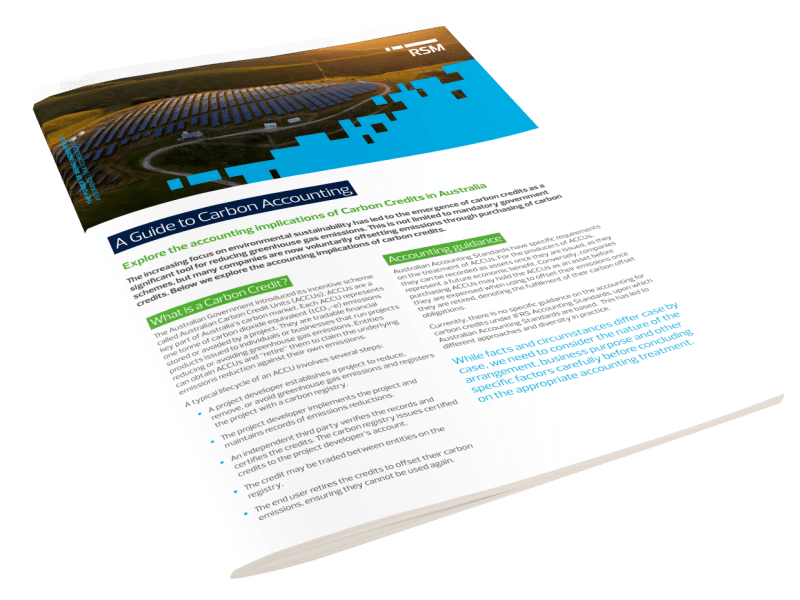Melbourne is a city in constant motion.
From major infrastructure projects like the North East Link to the rapid expansion of renewable energy initiatives and the growing complexity of the education, healthcare, and financial services sectors, the financial reporting environment is evolving just as quickly as the sectors we serve.
As auditor, Martin sees first-hand how this changing landscape creates both opportunities and challenges for businesses and public entities.
Accounting standards are struggling to keep pace with reality
One of the biggest challenges faced is that accounting standards often lag behind real-world developments. Take carbon credits, for example. They have been traded for years, yet there is still no dedicated accounting standard to deal with them. This creates uncertainty in how organisations should treat them: are they assets, marketing tools, or both?
Similarly, the rise of cloud-based systems raised fundamental questions about whether costs could be capitalised when the software wasn’t physically ‘owned.’ These kinds of issues highlight how standards often play catch-up, leaving businesses to apply frameworks that weren’t built with today’s challenges in mind.
Technical compliance challenges: Revenue recognition, leases and financial instruments
For many organisations, the introduction of major accounting standards in recent years, revenue recognition (AASB 15/1058), leases (AASB 16), and financial instruments (AASB 9), has been particularly disruptive. These standards are complex and require businesses to fundamentally change how they report transactions. For example, lease arrangements that once sat off the balance sheet are now fully recognised, bringing both assets and liabilities to the forefront.
The challenge isn’t just adopting these standards once; it’s about embedding the right processes and controls so that reporting stays consistent and reliable year after year.
Complexities in infrastructure and renewable energy
Large-scale projects, whether in transport or renewable energy, add another layer of complexity. In renewable energy, challenges with capitalising early-stage development costs, are they true assets, or just investigative expenditure? For operational projects, Power Purchase Agreements (PPAs), which may contain a derivative component, create volatility in financial reporting, as electricity prices can fluctuate significantly, even turning negative at times.
For infrastructure projects, the scale and long timeframes mean reporting accuracy is vital. Missteps in areas like revenue recognition, asset capitalisation, or long-term lease accounting can have consequences that last years.
Public sector pressure points
In the public sector, entities are all under pressure to demonstrate value for money and compliance with funding conditions while managing increasing complexity. ESG reporting is starting to emerge here too, and while it may not yet be mandated across the board, the process has already started. Public sector entities will need to prepare early to handle the significant data and disclosure requirements that ESG brings.
Lessons from new standards
Martin works with many organisations to help them navigate the introduction of AASB 15, 16 and 1058. His advice is always the same: don’t wait until the standard is effective to act. Early preparation, reviewing contracts, understanding obligations, and adjusting systems, is critical. Auditors often sit alongside CFOs and finance teams to interpret standards in the context of their specific business, so they can avoid surprises when audit season arrives.
Harnessing data analytics
Data analytics is also reshaping the audit process. In the past, testing relied on small samples. Today, advanced tools make it possible to analyse entire populations of data. This doesn’t necessarily make audits faster, but it does make them more effective. Efforts can now be focused on high-risk areas, providing deeper insights, and delivering greater value to clients.
Cross-border challenges with Chinese businesses
As a leader of RSM’s China Practice Group, Martin also sees the challenges faced by Chinese businesses operating in Australia, and Australian businesses expanding into China.
More often than not, the hurdles are cultural rather than technical. Differences in regulatory expectations, legal systems, and business practices can create friction, but with the right bilingual expertise and cultural understanding, those gaps can be bridged successfully.
Common mistakes in financial reporting
One of the most frequent issues is a lack of attention to detail in applying accounting standards consistently, particularly around revenue recognition, lease classification, and asset impairment. Errors often stem from misinterpretation of the standards or inadequate documentation to support key estimates and judgements.
Another critical area is the failure to apply the principle of substance over form. This is especially relevant in business combinations, where the legal form of a transaction may not reflect its economic reality. A classic example is a reverse acquisition, where the entity that is legally the acquiree is, in substance, the acquirer. If preparers focus solely on legal structure without considering control and substance, they risk misrepresenting the transaction in the financial statements.
Looking ahead: What’s next for Melbourne?
Looking three to five years ahead, these are the three key trends shaping Melbourne’s financial reporting landscape:
- ESG reporting – It will quickly move from a “nice to have” to a regulatory requirement, with complex implications for data collection, reporting, and assurance.
- Artificial intelligence – Already enhancing audit effectiveness, AI will become a powerful tool to analyse huge volumes of transactions, though human judgment will remain critical.
- Continually evolving standards – Accounting standards will keep adapting to new realities, and businesses will need to stay agile to comply and avoid misstatements.
By staying on top of evolving standards, embracing new technologies, and keeping substance over form, businesses can ensure financial reporting continues to support strong decision-making in Melbourne’s dynamic economy.
At its core, financial reporting is about trust.
Reach out if you would like to see how Martin can help dig through the minefield of financial reporting, his role is to help businesses, public sector entities, and investors see a clear, accurate picture of performance, even in the face of rapid change.






